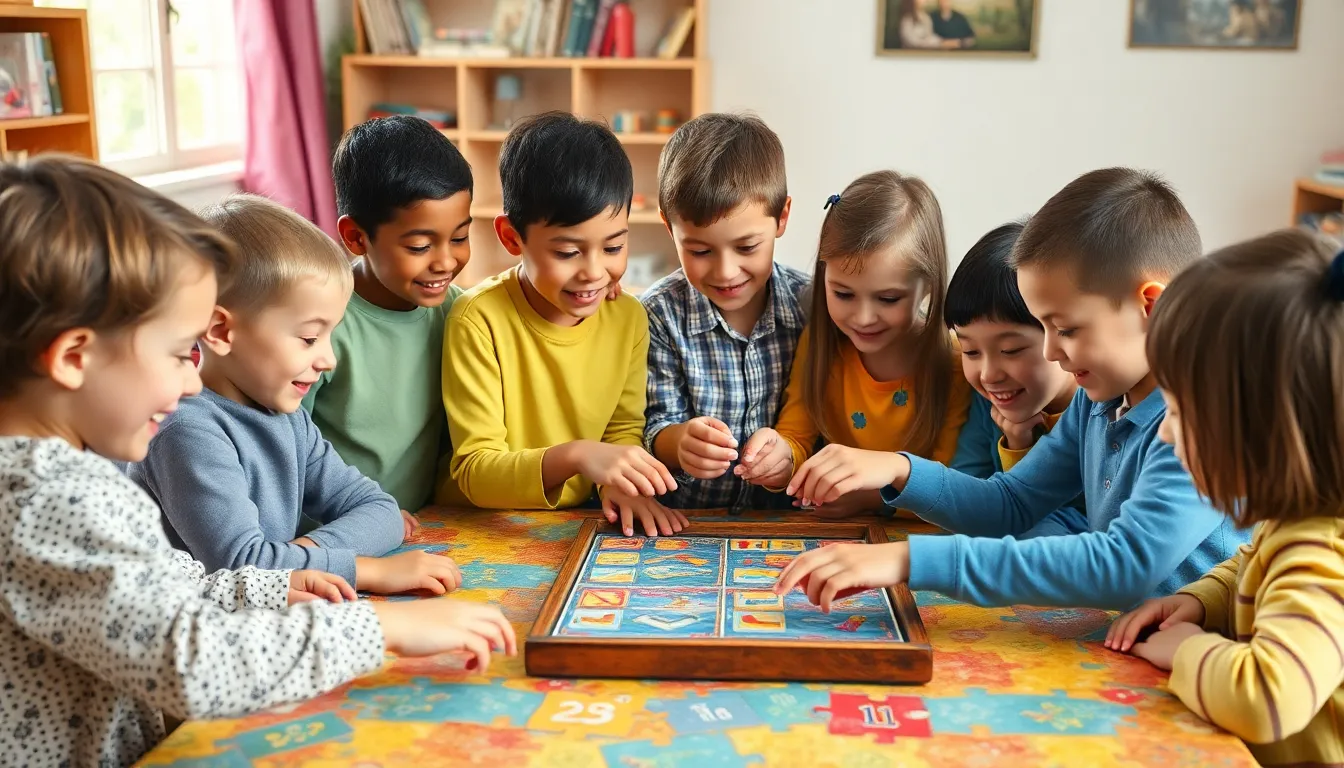Imagine a world where learning feels less like a chore and more like an epic quest. Educational games are transforming the way kids—and even adults—approach knowledge. Gone are the days of dull textbooks and monotonous lectures. Instead, players dive into interactive adventures that spark curiosity and creativity while sneaking in valuable lessons.
These games turn the classroom into a playground where math problems become treasure hunts and history lessons morph into thrilling time-travel escapades. It’s a win-win: players have a blast while their brains soak up information like a sponge. Whether it’s mastering fractions or exploring the solar system, educational games offer a fun-filled path to learning that keeps everyone engaged. So, why not trade in the old-school methods for a new-age approach that makes education entertaining?
Table of Contents
ToggleWhat Are Educational Games?
Educational games are tools designed to support learning while entertaining users. They blend fun with educational content, fostering knowledge retention through interactive experiences. These games often target subjects like math, science, and language arts, encouraging players to immerse themselves in the material.
Many educational games utilize rewards and challenges to motivate users. By offering feedback and progression, these games engage players more than traditional methods. Players often find themselves solving puzzles or completing tasks that reinforce concepts and skills.
Targeting various age groups, educational games can range from simple puzzles for young children to complex simulations for older students. Some games incorporate storytelling elements, creating narratives that make learning feel like an adventure. This aspect grabs players’ attention and enhances their cognitive abilities.
Consider how gameplay can enhance problem-solving skills. When players face challenges, they develop critical thinking strategies and learn to apply knowledge in real-world scenarios. Educational games also promote collaboration, as many allow players to work in teams, cultivating teamwork and communication skills.
Game design plays a vital role in making the experience enjoyable and effective. Visuals, sounds, and intuitive interfaces help create a captivating environment that encourages exploration. Well-crafted educational games also provide measurable outcomes, allowing educators and parents to track progress and understand a child’s learning journey.
Educational games create a stimulating environment where learning becomes a joyful pursuit. They effectively bridge the gap between knowledge acquisition and skill development, driving interest in various subjects.
Benefits of Educational Games

Educational games offer significant advantages, enriching the learning experience for users of all ages. They effectively blend fun and educational content, making knowledge acquisition more enjoyable.
Cognitive Development
Educational games play a key role in enhancing cognitive skills. They stimulate critical thinking through puzzles, challenges, and strategic gameplay. Players develop problem-solving abilities as they navigate various scenarios and make decisions. Memory retention improves as dynamic interactions reinforce learning concepts. Engaging storytelling elements deepen comprehension, encouraging players to connect new information to existing knowledge. Overall, these games promote a well-rounded mental skill set that benefits learners in academic environments.
Social Skills Enhancement
Educational games also significantly enhance social skills. Collaborative gameplay encourages teamwork among participants. Players share ideas and strategies, fostering communication and interpersonal interactions. Many games promote healthy competition, teaching players how to handle victories and setbacks gracefully. These experiences cultivate empathy and understanding, as players work together towards common goals. Ultimately, the social skills gained through educational games contribute to personal and academic growth.
Types of Educational Games
Educational games come in various forms, each designed to enhance learning through distinct methods. Understanding these types can help educators and parents select the best options for their students.
Digital vs. Traditional
Digital educational games offer interactive experiences through online platforms and applications. These games often feature dynamic graphics and instant feedback, making learning engaging. Users can access a wide range of subjects with just a few clicks. Traditional games, on the other hand, include board games and card games that promote hands-on learning. These physical formats encourage face-to-face interactions. Both types have unique benefits: digital games provide immediate rewards, while traditional games often foster teamwork and social skills.
Subject-Specific Games
Subject-specific games target particular academic areas such as math, science, and language arts. Math games enhance problem-solving and critical thinking skills through puzzles and challenges. Science games allow players to explore complex concepts, such as ecosystems or physics, in a fun way. Language arts games focus on vocabulary, grammar, and comprehension, making reading enjoyable. These games connect learning with real-world scenarios, increasing retention and understanding. Engaging players through specific subjects ensures a well-rounded educational experience.
Best Practices for Implementation
Implementing educational games effectively requires thoughtful strategies. Consider the specific needs of learners to enhance engagement and learning outcomes.
Age-Appropriate Selection
Choose games that align with the developmental stages of students. Young children benefit from simple puzzles that introduce basic concepts. In contrast, older students thrive with complex simulations that challenge critical thinking. Age-appropriate content keeps learners motivated and active, ensuring they fully grasp essential ideas. Educators can utilize platforms that offer ratings or reviews, guiding them toward suitable options.
Integrating Games into Curriculum
Incorporating educational games into the curriculum enhances traditional teaching methods. Games complement lessons by providing hands-on experiences and promoting active participation. Scheduling game time during relevant subjects allows for deeper understanding of the material. Facilitators should design assessments that evaluate the knowledge gained through gameplay, connecting these experiences to academic goals. Providing opportunities for reflection post-gameplay strengthens comprehension and retention of concepts.
Educational games have the potential to revolutionize the learning experience. By merging fun with education they create an environment where knowledge thrives. This innovative approach engages learners of all ages and fosters essential skills like problem-solving and collaboration.
The variety of available games caters to different learning styles and subjects. Whether digital or traditional these tools encourage exploration and creativity. As educators and parents recognize the benefits of integrating games into the curriculum the future of learning looks brighter and more engaging.
Ultimately educational games are not just a trend but a valuable resource for enriching education. They transform the way knowledge is acquired making learning an enjoyable journey rather than a chore.





